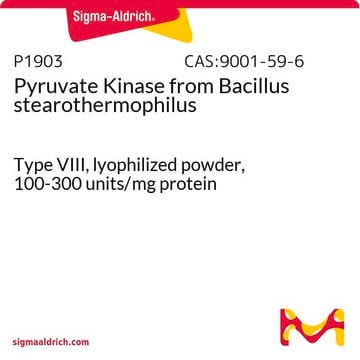P2014
Phosphorylase Kinase from rabbit muscle
lyophilized powder, ≥60 units/mg protein
Synonym(s):
ATP:phosphorylase-b phosphotransferase, Dephosphophosphorylase kinase
Sign Into View Organizational & Contract Pricing
All Photos(1)
About This Item
CAS Number:
MDL number:
UNSPSC Code:
12352204
NACRES:
NA.54
Recommended Products
form
lyophilized powder
specific activity
≥60 units/mg protein
composition
Protein, 20-40% biuret
foreign activity
ATPase ≤0.5%
phosphorylase a ≤1%
phosphorylase b ≤5%
storage temp.
−20°C
General description
Phosphorylase kinase contains four subunits each containing an α, β, γ, and sigma component. The sigma component binds 4 calcium molecules and is termed calmodulin while the γ unit acts as the catalytic subunit.
Application
Phosphorylase kinase from rabbit muscle has been used in a study to assess features of glycogen phosphorylase. It has also been used in a study to investigate the activation of different forms of muscle phosphorylase kinase by actin.
Unit Definition
One unit will form 1.0 μmolar unit of phosphorylase a from phosphorylase b per min at pH 7.7 at 30°C in the presence of ATP.
Physical form
Lyophilized powder containing (NH4)2SO4, sucrose, β-glycerophosphate and dithioerythritol
Storage Class Code
11 - Combustible Solids
WGK
WGK 3
Flash Point(F)
Not applicable
Flash Point(C)
Not applicable
Personal Protective Equipment
dust mask type N95 (US), Eyeshields, Gloves
Certificates of Analysis (COA)
Search for Certificates of Analysis (COA) by entering the products Lot/Batch Number. Lot and Batch Numbers can be found on a product’s label following the words ‘Lot’ or ‘Batch’.
Already Own This Product?
Find documentation for the products that you have recently purchased in the Document Library.
Monica Balsera et al.
Planta, 237(2), 619-635 (2012-12-12)
Uncovered in studies on photosynthesis 35 years ago, redox regulation has been extended to all types of living cells. We understand a great deal about the occurrence, function, and mechanism of action of this mode of regulation, but we know little
Eijiro Ozawa
Proceedings of the Japan Academy. Series B, Physical and biological sciences, 87(8), 486-508 (2011-10-12)
It had long been one of the crucial questions in muscle physiology how glycogenolysis is regulated in connection with muscle contraction, when we found the answer to this question in the last half of the 1960s. By that time, the
G V Silonova et al.
Biokhimiia (Moscow, Russia), 49(1), 127-135 (1984-01-01)
The activation of different forms of muscle phosphorylase kinase by actin has been studied. F-actin which is polymerized by 2 mM MgCl2 is a more effective activator of phosphorylase kinase than F-actin polymerized by 50 mM KCl. There is evidence
S Camus et al.
Oncogene, 31(39), 4333-4342 (2011-12-20)
Angiogenesis is essential for development and tumor progression. With the aim of identifying new compound inhibitors of the angiogenesis process, we used an established enhanced green fluorescent protein-transgenic zebrafish line to develop an automated assay that enables high-throughput screening of
Kathryn A Skelding et al.
Advances in experimental medicine and biology, 740, 703-730 (2012-03-29)
Calcium/calmodulin-stimulated protein kinases can be classified as one of two types - restricted or multifunctional. This family of kinases contains several structural similarities: all possess a calmodulin binding motif and an autoinhibitory region. In addition, all of the calcium/calmodulin-stimulated protein
Our team of scientists has experience in all areas of research including Life Science, Material Science, Chemical Synthesis, Chromatography, Analytical and many others.
Contact Technical Service







